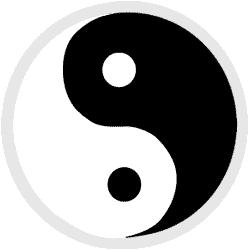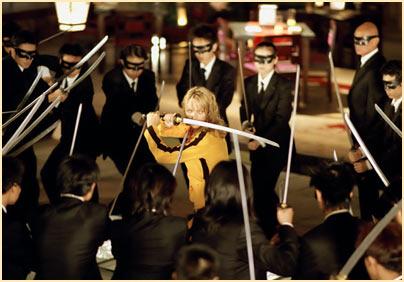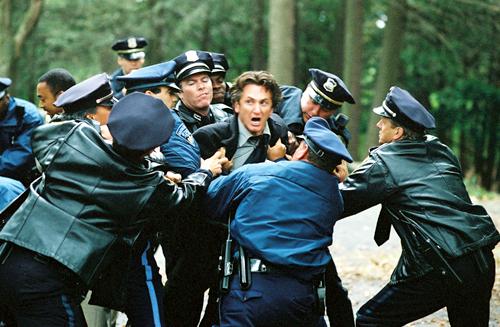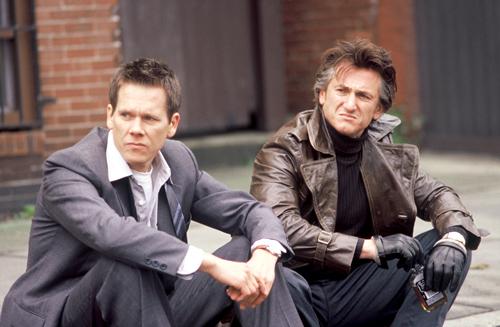|
The
omen was clear: I opened the newspaper, and saw two film advertisements
facing each other on opposite pages. One for Kill Bill Vol.
One and the other for Mystic River. My instincts
told me these two films would be an ideal platform to discuss some
ideas that had been percolating in me for a while regarding what
I'll call cultural dialogs -- two artists positing alternative views
on what film means and what its potential is within culture.
Also by dialog I mean a kind of collision or dialectic of ideas.
When I say dialectic I mean in the Hegelian (as in the philosopher
Hegel) sense: a thesis or idea meets an antithesis or opposing idea,
with ideally the result being the synthesis or new melding of the
two that  transcends
both. In eastern philosophy the same concept is encapsulated in
the form of the “Yin Yang” -– the difference being
(in film) that the primary vehicle for the dialectic is story, while
of Yin Yang it is the image. These opposing forces will come together
and merge (often co-opting each other as well as older forms), and
also create cultural choices, forks in the road of history, where
dialog ends and orthodoxy begins. transcends
both. In eastern philosophy the same concept is encapsulated in
the form of the “Yin Yang” -– the difference being
(in film) that the primary vehicle for the dialectic is story, while
of Yin Yang it is the image. These opposing forces will come together
and merge (often co-opting each other as well as older forms), and
also create cultural choices, forks in the road of history, where
dialog ends and orthodoxy begins.
The
core “idea” of Quentin Tarantino’s Kill Bill
is that it questions film form and cultural conventions in a new
and provocative way, while Mystic River is classical in
its theme and style –- conservative in a sense, and yet fundamentally
forward thinking and humanistic. Conversely, Tarantino’s film
edges us toward toward retro-fascism, even as it goads us beyond
humanistic sentimentality to grapple with the essential paradox
that anything, stripped of morality, can become a thing of beauty.
So
with Tarantino he uses a cultural fascination with violence, with
action, with the kinetic, as an excuse to play with aesthetic experiments,
stylistic meanderings, as he gropes for new film forms and new language.
Tarantino believes that greatness lies in finding a way beyond convention
and to define the borders within which culture lives. So he plays
with Godard, he dabbles in Kung-Fu genre and sixties pop culture,
he mixes it all together like a kind of cinematic Emeril, but still,
somehow, missing something -– at least in my mind. Tarantino
doesn't seem to understand the idea of the whole, of a final sense
of feeling that sums up the piece, the theme, the idea, what he
wants to say -– unless what he wants to say amounts to nothing
more than the sum of the stylistic meanderings he takes us on. He
seems mastered by, not in mastery of, the elements at his command.
He is obviously not a steward of morality, for moral interpretations
are not his responsibility, but ours. Tarantino is the poster child
of the fragmented post-modernist, who doesn’t believe that
any cohesive vision of truth is possible, and any attempt in that
direction would in fact be pretentious. He is the ultimate cynic,
who back in ancient Athens would be battling Socrates as he (Tarantino)
would try to convince him that there wasn't any cohesive way to
know anything.
Perhaps
what Tarantino “says” is summed up in the end of the
Kill Bill Vol. One, in the stillness of the snow, and the
peace that surrounds the violence of the final scene in the snow-drenched
Japanese garden, the Zen like moment of silence that he wants his
love of style and his mockery of style and violence to lead us to
(it seems). Perhaps what he wants to say is that it (film and the
process of making them) all makes him speechless, rapt, and in a
state of reverie. But yet there is no movement back from the silence
into life –- we are only left there hanging, without compass.
We are like young children thrown into the pool, and he hopes we
swim, and he could care less if we don’t. Or better, we are
in the labyrinth, with no “golden string” of history
and culture strung out behind us to lead us back to sanity and reason.
Some
may say if Tarantino tried to tell us where to go or what to feel
from there would be tantamount to moralizing –- a didacticism
that he could never be party to, being that he is fundamentally
anti-intellectual in his intellectualism. Tarantino is really the
 provocateur
of a the new outlaw elite, the game boy intellectual who discards
all the sham intellectuality and pretensions of enlightened, rational
elitism and instead favors a populist Zen that states that God can
be found anywhere, even in killing and violence provocateur
of a the new outlaw elite, the game boy intellectual who discards
all the sham intellectuality and pretensions of enlightened, rational
elitism and instead favors a populist Zen that states that God can
be found anywhere, even in killing and violence
-– that God (or in the case of Uma Thurman, the Goddess) is
as much lack of compassion as compassion, that the Goddess is as
much a killer as a saint.
The
limitations of Tarantino lie in the culture as much as himself,
the “market” in which Tarantino and most recent film
directors seem trapped. The story is really the most basic: revenge.
It is single focused and moves forward like a freight train, even
if there are a couple of dabblings in non-linear narrative. Basically
Tarantino hangs his hat on a thread of a story as an excuse for
some kick-ass fight scenes like no other ever filmed -– all
in services to a young audience hungry to see Uma kick some butt.
But these scenes are not so much bloody as beautiful and/or funny,
depending on the director’s mood. They are also strangely
cold, without feeling, yet with the beauty of ice, of the icy coldness
of the stars in a clear night sky. Tarantino’s Kill Bill
is ultimately a comment on nature -- that nature is cold, lacking
compassion for its inhabitants, and that only the strong will prevail
within it. The film, like its American protagonist and country of
origin, is aggressive, and the aggression will win  out
in the global struggle for dominance out
in the global struggle for dominance
–- the pure White Girl (even if she’s called Black Mamba)
will defeat the mix-breed Asian whore played by Lucy Liu. Why? Because
the White Girl cares more about family than about business, and
money is the raison d’etre of Lucy Liu’s Asian
mafioso matron.
The
supposed moral (and racial?) purity of Thurman's“Bride”
–- her “virginity” in her white bride’s
gown (although she was pregnant at the wedding, an ironic hint at
the how The Bride is as compromised as all the others) -–
her “purity” makes the whole exercise in revenge absurd
in the cosmic and existential sense: she battles and kills her foes
in the most violent way imaginable to do what? To make a statement,
ostensibly, about violence against women, to put a stop to that
violence. This is the paradox and absurdity of the warrior, who
must fight like hell to protect his/her right not to fight –-
who is dragged unwillingly into battle, like America into WW II
or into the War on Terror. Or at least so goes the myth. Thurman’s
“bride” is the quintessential American: a loner, a cowboy,
an idealist who just wants to be left alone to raise their kids
in the vast expanse of the American West (where her wedding takes
place) –- but those goddamn Asians, half-breeds, flawed one-eyed
Blondes, Easterners, and Blacks all are infringing on her God given
right just to be left alone.
But
the trouble is, she was with them at the beginning: the seed of
her opposite was in her from the beginning.
And
so it is with the Yin Yang of Kill Bill. The Bride is pregnant
at her wedding, she is already confirmed to conflict with her innocent
myth -– she cannot be what she wants to be because she is
already corrupted by Bill’s seed. The seed of her corruption,
like the small white dot in the black half of the Yin Yang symbol
(with the White half having the corresponding black dot) -–
all this means that she will inevitably become her opposite: the
mother, protector and giver of life, resurrects again as the assassin.
This is the law of Yin Yang and of cultural dialectics -–
that whatever a thing is, so surely it will become its opposite,
just like the day becomes night and each holds within it the seed
of the other, the sun and the moon. The Bride, who bears the seed
of Bill’s child, cannot escape the violence she seeks to flee
from. Likewise, America, in its perennial search for a more perfect
union, cannot escape from its corrupt European roots and its own
violence wielded to “protect” itself (and, as the myth
goes, always inflicted with a purity of intent), and may be destined
to become a monstrosity of authoritarianism hell bent on aggressively
dominating the entire globe to defend its brand of consumer “freedom”
–- even as the symbols of that freedom turn on themselves
and become their opposite. Thus the Stars and Stripes and the Swastika
become the same –- as both are empty symbols, animated only
by the actions behind them. This is the omen, the warning of Kill
Bill. This is what the film portends. Like all artists, Tarantino
taps into the cultural mindset, the underbelly of this reality,
and turns the soil so we can see the worms underneath.
The
gift of philosophy, which is why I shamelessly pander to it and
succumb to it and ultimately try to get readers to love it like
I do -– the gift of philosophy is awareness. Awareness means
growth and growth means avoidance, potentially, of past mistakes.
Americans, loath to philosophize because it compromises the ability
to act with clarity and conviction (again, so goes the myth), dooms
the country to inevitable decline like all other civilizations that
came before it. However, there are cracks as we stand on the Razor’s
Edge of American culture. Mystic River is a case in point.
While Kill Bill revels in violence as art and dehumanizes
everything into comic book cliches, and aggressively intimidates
us into thinking there is no alternative, it is this gift of philosophy
and ability to learn that shows up in a film like Mystic River.
The film is like the public intellectual who reacts against the
futility of post-modernism, egging us on to believe and to embrace
the notion of cohesive truths because if we don’t we are doomed
to the creeping fascism condoned by intellectuals of all stripes
who opt out of any kind of social responsibility.
That
these two films sat on opposite pages of the newspaper said to me
that they were opposing forces in the cultural dialectic, and that
Tarantino and Eastwood are participating in a kind of cultural dialog.
While Kill Bill takes on the cultural and cinematic frontier,
and is at the same time courageous and cowardly, Mystic River,
directed by Clint  Eastwood
and written by Brian Helgeland (based on a novel by Dennis Lehane),
has the surety of a master couched in history, understanding the
great lessons of civilization, and not willing to toss them all
out in the name of retrograde cultural progress. While Kill
Bill is like a medieval map of the post modern, with Mexico
a bit too big and Alaska much too small, Mystic River is
an accurate map of the human condition as it sits today. Fundamentally,
that condition is tragic, but not without justice at some cosmic
level –- as if the tragic stories we tell have the potential
to redeem us. Eastwood
and written by Brian Helgeland (based on a novel by Dennis Lehane),
has the surety of a master couched in history, understanding the
great lessons of civilization, and not willing to toss them all
out in the name of retrograde cultural progress. While Kill
Bill is like a medieval map of the post modern, with Mexico
a bit too big and Alaska much too small, Mystic River is
an accurate map of the human condition as it sits today. Fundamentally,
that condition is tragic, but not without justice at some cosmic
level –- as if the tragic stories we tell have the potential
to redeem us.
Sean
Penn’s Jimmy is not unlike Antigone or Medea of the Greek
tragedies, a person who because of passion takes matters into their
own hands, and with tragic ends. The Greek namos or law
is personified in detective Sean Devine (Kevin Bacon), who nonetheless
comes to understand Jimmy’s committing murder as justified
on a level outside of the law; because of Dave’s (played by
Tim Robbins) murder of the child molester, Dave's subsequent murder
by Jimmy, if not legally justified, at least brings the tension
between Sean and Jimmy to a point of stasis. It is this stasis or
balance between individual passion and communal law that is the
underlying message of Mystic River, and that this stasis
or balance happens at a level of a spiritual and human sacrifice
that often transcend the laws of the community. Mystic River
is balanced, cohesive and symmetrical in a way that shows a certain
kind of mastery: the mastery of knowing what you want to do and
executing on that plan.
It
is mastery of intentions, awareness of what the implications of
deliberately choosing the mixture of sound and voice and image that
makes Mystic River such a joy to watch, but yet also makes
it safe, like a Rembrandt, as if mastery were frozen in time, and
we should accept it and not improve on it -– that all of our
intellectual meanderings since Plato will eventually bring us back
to him. Clint Eastwood has subdued style to story, while Kill
Bill is all style and no story -– a film of form without
content, yet exciting and liberating in its dangerous assault on
narrative convention. While Mystic River bases itself on
a book, on on the literary traditions of tragedy dating back to
Sophocles, Kill Bill bases itself on the video game and
the Kung Fu movie, with a smattering of Eastern philosophy for good
measure (although Tarantino self-consciously forces “chapters”
on us, as if to remind us that he knows he's supposed by be literary
because he is, after all, an artist).
Marshall
McLuhan states that all new mediums, like film, encapsulate older
mediums –- in the case of film, novels and plays. So video
games often encapsulate films or comic books. But with Kill
Bill there is a devolution: the video game and the comic book
dominate -- the teenager has taken over the household, tying the
geriatric father in the closet, or better, terminating him, like
Swarzenegger terminated Gray Davis. Similarly, Bill, emblematic
of the corrupt father-patriarch of the polluted mess we’ve
created with globalization, must give way to the pure Aryan woman,
Uma, who will destroy him like the old sixties commercial, because
“you don’t mess with Mother Nature.” Or should
we say “Mother America”?
While
Mystic River depends, like the western notion of dialectic,
on the unfolding of time and the historical evolution of its story,
Kill Bill focuses us on the moment and seeks rather to
kill time, much like The Bride seeks to kill her male oppressor,
Bill. Mystic River revels in time, seeing it not so much
as an enemy as a sage teacher aching to tell us her secrets and
to help us toward reconciliation. While Kill Bill has too
little story told in too much time, Mystic River has too
little time for the fullness of it all. In addition, in Mystic
River nature is to be trusted, rather than dominated and destroyed
as in Kill Bill -- Mystic River would have us
finally surrender to inevitability of death rather than battle it.
In Mystic River, any struggle against nature is ultimately
futile, as time will  prevail
and laugh at us: Sean Penn’s character of Jimmy cannot find
justice or revenge because any justice he seeks, and lack of justice
he imparts, can only be seen in the context of his own folly. There
can be no heroes in Mystic River, no purity and no absolutes
within the characters themselves, because all are compromised, and
all the living are dead already, and the acceptance of this tragic
truth informs the present, makes it somehow sacred. “David
died twenty years ago,” he says at the end of the film, alluding
to the soul death of his friend at the hand of molesters. prevail
and laugh at us: Sean Penn’s character of Jimmy cannot find
justice or revenge because any justice he seeks, and lack of justice
he imparts, can only be seen in the context of his own folly. There
can be no heroes in Mystic River, no purity and no absolutes
within the characters themselves, because all are compromised, and
all the living are dead already, and the acceptance of this tragic
truth informs the present, makes it somehow sacred. “David
died twenty years ago,” he says at the end of the film, alluding
to the soul death of his friend at the hand of molesters.
The
fundamental struggle of Kill Bill and Mystic River,
at the level of cultural dialectics, is America’s razor’s
edge struggle between the apparent need to aggressively dominate
the world and our potential to humanize the world. While our globalistic
and imperialistic tendencies currently dominate, as “unwilling”
protectors of democracy who must retain vigilance or the Saddams
or Osamas will surely destroy us, America walks this fine line,
with a tipping point yet to occur that could move the country into
total orthodoxy of a kind of corporate, consumer-driven fascism
or toward the a humanistic revival that recognizes that Martin Luther
King's (among others) message of a human community grounded in tolerance
and social and personal responsibility as the only path out of fear
and suffering. Kill Bill and Mystic River are
two new films that again express this dialog between America’s
dark and light sides, America’s Yin Yang of conformity and
security at all costs, with its handmaidens of corporatism, militarism
and technology gone mad, or in opposition, the support of freedom
and tolerance, even at the sacrifice of the nation itself. In a
sense, Hamilton's pragmatism and Jefferson’s idealism are
still battling it out, as are the North and the South of the Civil
War. If the “pragmatic” cynics and fundamentalists prevail,
and they well might, the consumer-fortress of America may well become
the nation of the damned, trapped by cycles of violence without
escape, perennially reinforcing its myth of freedom even as that
freedom has long been legislated out of existence by ever more powerful
“Patriot” acts. By then we will have fallen down the
path of the Romans, becoming a sham republic under the Caesars —
a place even Hamilton and Robert E. Lee would be ashamed of, even
as we become fully recognizable to George Orwell as his vision of
1984.
“What
links fascism in its various forms is the ‘dream of the good
community.’ The good community based on race, the good community
based on religion, the good community based on purity.” --
Bernard-Heni Levy, author “Who Killed Daniel Pearl”
--
Don Thompson
Discuss
this article on the nextPix FORUM by going to its discussion
thread:
[click here]
Don
Thompson is a filmmaker/producer and co-founder of SolPix. You can
find out more about Don by going to the website for his production
company nextpix.
You can also email him at don@nextpix.com
Copyright Web del Sol, 2003
|






